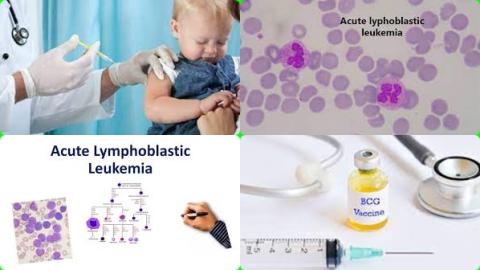
Objectives:
Infections may play a role in the etiology of childhood cancer and immunizations may be protective because vaccinations stimulate the immune system. Observational studies reported inconsistent associations between vaccination and risk of childhood cancer. Therefore, this review article has been conducted.
Does vaccination reduce the risk of childhood leukemia?
Study design:
This review article included 35 studies for inclusion in 27 specific analyses on 11 different childhood cancer outcomes after exposure to 9 different types of vaccination.
The minority of the studies included in the meta-analysis were retrospective cohort or case cohort studies (31%), the majority were case-control studies (69%), of which 18 included population-based and 4 hospital-based controls.
Studies were published between 1968 and 2019 and covered a study period of 65 years (1943 to 2008).
The studies were conducted in Europe (57%), North America (26%), South America (8%), Australia or New Zealand (6%) and Asia (3%) with sample sizes ranging from 148 to 1,224,914 participants.
Most studies examined only children under 18 years of age.
Overall, the methodological quality assessments of the 35 studies included in the meta-analysis yielded an average score of 4.7 out of 9.0 for the NOS.
Results and conclusions:
The investigators found a significantly reduced risk of 51% for leukemia death [summary OR = 0.49, 95% CI = 0.32 to 0.74, I2 = 36%, n = 4, p value = 0.20] after bacillus Calmette-Guérin (BCG) vaccination, compared to children without this vaccination.
The investigators found a significantly reduced risk of 24% for acute lymphoblastic leukemia [summary OR = 0.76, 95% CI = 0.65 to 0.90, I2 = 20%, n = 5, p value = 0.29] after Haemophilus influenzae type b vaccination, compared to children without this vaccination.
The investigators found a significantly reduced risk of 43% for leukemia [summary OR = 0.57, 95% CI = 0.36 to 0.88, I2 = 74%, n = 4, p value = 0.01] after three or more vaccinations of any type, compared to children without these vaccinations.
The investigators found a significantly reduced risk of 38% for acute lymphoblastic leukemia [summary OR = 0.62, 95% CI = 0.46 to 0.85, I2 = 55%, n = 5, p value = 0.06] after three or more vaccinations of any type, compared to children without these vaccinations.
The investigators concluded these results are consistent with the hypothesis that vaccinations reduce the risk of childhood leukemia. However, the robustness and validity of these results is limited due to the small number, substantial heterogeneity and methodological limitations of available studies.
Original title:
Vaccination and the Risk of Childhood Cancer-A Systematic Review and Meta-Analysis by Marron M, Brackmann LK, […], Ahrens W.
Link:
https://www.ncbi.nlm.nih.gov/pmc/articles/PMC7862764/
Additional information of El Mondo:
Find more information/studies on RCTs/cohort/significantly/review article, vaccination and food fortification/malnutrition right here.
Acute lymphocytic leukemia (ALL) is also called acute lymphoblastic leukemia and is a type of cancer of the blood and bone marrow - the spongy tissue inside bones where blood cells are made.
“Acute” means that the leukemia can progress quickly and if not treated, would probably be fatal within a few months.
"Lymphocytic" means it develops from early (immature) forms of lymphocytes, a type of white blood cell.
Acute lymphocytic leukemia is the most common type of cancer in children and treatments result in a good chance for a cure.